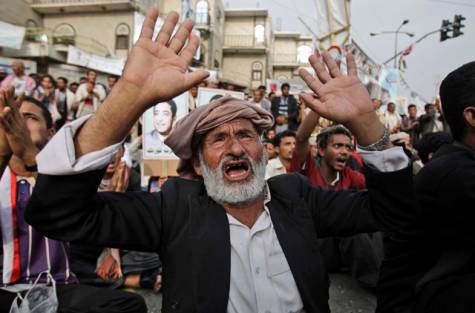
Hundreds of thousands of people continue to join protests across Yemen in opposition to President Saleh’s authoritarian and corrupt government. On 15 July at least ten people were killed and many wounded in clashes between government forces and tribes people supporting protestors in Taiz. 7 civilians were killed and 30 wounded when government forces fired mortars in the several neighbourhoods in Taiz.
The US, EU countries and Gulf states continue to sideline the protests (although recently promoting Saleh to ‘dictator’ status), instead insisting the country is in danger of a ‘terrorist’ take over from Al Qaeda in the Arabian Peninsula (AQAP) operatives in the region. Many Yemenis consider Al Qaeda operating inside their country as a myth that only allows Saleh to crush his domestic opponents and receive US money.
In 2010, Yemen reportedly received $155 million in military aid from the US. However, the US Central Command has proposed a new package of $1.6 billion over the coming five years.
Meanwhile, the US continues Predator drone bombings across the country, causing dozens of civilian deaths and casualties. They also deploy CIA operatives on the ground, gathering intelligence for the bombings. The British now also have around 80 Royal Marine commandos in Southern Yemen, its former colony. The CIA is reportedly building a new secret air base in the region, for further drone attacks in Yemen.
Despite wrongly being often labelled as the head of AQAP, US born cleric Anwar Al Awlaki is said to be a key US target in Yemen. He is seen by many Yemenis as a madman and even a possible US agent. He reputedly visited the Pentagon ‘for lunch’ in 2002. Recent drone strike attempts on Al Awlaki have killed numerous civilians, but the US has yet to assassinate him.
President Saleh remains in Saudi Arabia after treatment for wounds inflicted by an explosion at his palace in June. The exact nature of the explosion is still unconfirmed, but a foreign coordinated assassination attempt or indeed a US drone attack is yet to be ruled out and would be in line with the plans to get rid of a tyrant now made unfashionable to the US public and a potential liability to imperialism in the region.
In the past two months, the US and Saudis have worked together to design a post-Saleh regime that will continue to serve their interests. In June US Secretary of Near East Affairs, Jeffery Feltman, visited Yemen and Saudi Arabia and called for ‘an immediate, peaceful, and orderly transition’ of power in Yemen.
The US ambassador in Yemen, Gerald Feierstein, has been in talks with the bourgeois opposition since March about forming a coalition government. He also held talks with Yemen’s chief of General Staff Ahmed Ali Al Ashwal and Brigadier Mjahid Ghashim, the chief of military intelligence.
The opposition Joint Meetings Party (JMP) is a mix of Nasserists, opportunist socialists, Baathists and Islamists, but enjoys little support amongst working class youth and street demonstrators. The JMP has collaborated with Saleh for years, so is unlikely to ever hold him to account for his crimes but more likely to try to follow the US settlement plan that would see Saleh leave office with immunity and his family’s wealth intact.
Protester Tawakul Karman announced on 16 July the formation of a transitional presidential council to reporters in Sanaa. Although in its early days, the 17-member body includes a former prime minister Haider Al Attas, ex-defence minister Abdullah Eleiwah, business people and civil society leaders.
The Civic Coalition of Revolutionary Youth, which includes 52 alliances of revolutionary youth activists around Yemen of more than 10,000 members, rejected the new transitional council and its method of formation (by fiat and without consultation), calling it an exclusionary and divisive body. It is yet to be seen what forces exist in this new body and whether Yemenis will just find it more a confusion and fragmentation than a help to the existing movement.
The US and its British allies would have no qualms about continuing to sponsor a Yemeni military regime, under whoever eventually succeeds Saleh, in order to get precious access to this vital geo-strategic location in the Middle East.
Anthony Rupert




